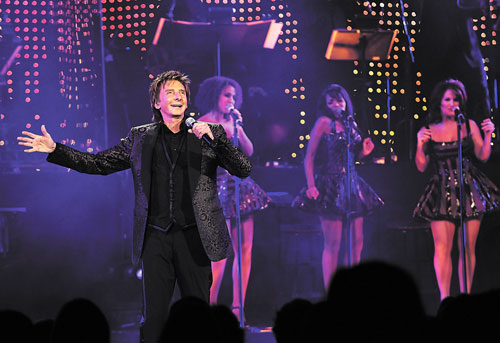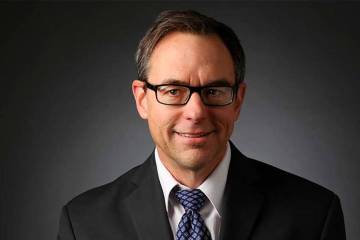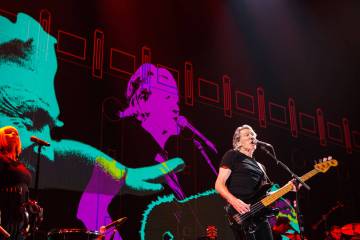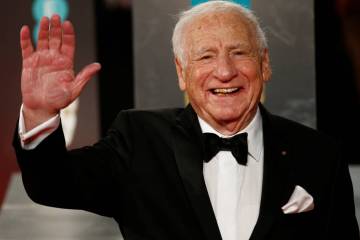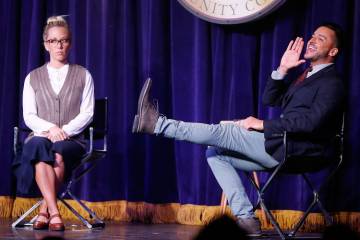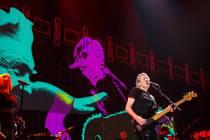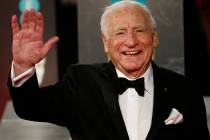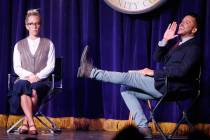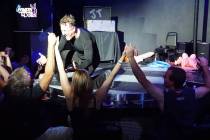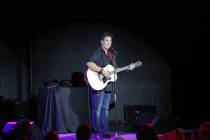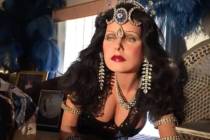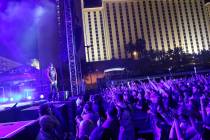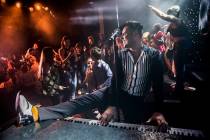Barry Manilow
That Barry Manilow sure knows how to make an entrance. And an exit, too.
Manilow didn't sustain a 35-year career by doing things small or subtle, except maybe that one piano ballad per show. The rest of it's as big as the Silly Putty stretch of the last note on "Even Now" or the butt-off-the-piano bench "Weekend in New England."
His new show at Paris Las Vegas begins, after considerable buildup, with a blindingly bright sign spelling out M-A-N-I-L-O-W in giant gold letters on the otherwise black stage. Then he appears, all by himself (the 10-piece band still hidden behind a scrim), throws his arms wide and belts out "Come!" as in the chorus of his first hit, "Could It Be Magic."
It ends with the star quick-changed into a dapper Fred Astaire tux with tails and carnation, high-kicking in front of the dazzling LCD colors of a video panel for "Copacabana," his most beloved hit.
Everything in the middle is equally staged with sophisticated razzle-dazzle by veteran pop director Jeffrey Hornaday, and is sleek and focused, about as good as a Manilow show can be at this point.
Does that sound like a backhanded compliment? That's a point of perception. With Manilow, I take the same detached critic's stance I do with Cher or "Phantom of the Opera." You've had decades to make up your mind already. The melodrama that makes one person buy a ticket might be what makes another stay away.
He wouldn't be Manilow if he didn't do the Jack Benny hand under the chin when he introduces a lesser-known song ("I Want to Be Somebody's Baby") from his second album: "It's the album that had 'Mandy' on it, so maybe somebody knows this album." Or telling the crowd, "Thanks for giving your time" as he sings the first word of "Somewhere in the Night."
Manilow does not reinvent himself, creating new reasons for the outside world to pay attention to him. Few artists of his tenure do that, and fewer still would gain anything by it at this point.
Nor is there a last-of-the-breed poignancy you get with a singer such as Tony Bennett, who becomes more precious with each passing year. Most of Manilow's '70s pop contemporaries keep on trucking as well, from the Eagles to Elton John.
So really, the standards for a Barry Manilow show are simple: Is he keeping himself engaged, and thus his audience? Is the show put together with panache? Does he still sound good?
Based on a media night last week -- the third weekend of his new two-year residency at Paris -- you can answer the first two with a resounding yes, and the third with a qualified one.
Manilow, in fact, sounded so good that fellow scribes seated closer to the stage were pretty sure he was lip-syncing. His raspy speaking voice between songs was quite a contrast to the smooth singing. And the pitch that wavered when I last saw him at the Las Vegas Hilton in August was perfect this time.
But his microphone also was "hot" enough on the opening numbers to create feedback, and he asked the sound guy to lower the level. Remember, too, the four backing singers that smooth the chorus vocals. All I can say is the technology is so good now -- the ability to blend live and recorded singing so seamless -- it's easier to know when someone isn't using it (Cher, or Manilow last summer) than when they are.
Manilow's show took various turns during his five years at the Hilton. But this one sticks to a concert overview of the hits, with only a brief detour into a trio of solid covers from his latest album, "The Greatest Love Songs of All Time."
Hornaday unifies the show with a Parisian theme, heavy on artwork from the Louvre, depicted on a quintet of video panels moving around the stage in various configurations. The video and a lot of subtractive use of black keep the star and his quartet of singer-dancers from being swallowed by the impossibly wide stage.
Major segments of the Hilton show carry over, and the little dashes of good taste can be as discreet as changing the dancers' requisite hoop skirts for "Bandstand Boogie" to coordinated black and white.
The slight tilt to Manilow's early work includes an autobiographical stretch, when he reminisces about his grandfather taking him as a 4-year-old to a Times Square recording booth for the attempt at singing that opens his debut album.
That sets up a touching introduction to "This One's for You." Of course it doesn't stop there, but goes on to show video footage, fake-scratched like an old movie, of the grandfather leading the boy from the subway to Times Square.
Wouldn't be a Manilow show if it didn't.
Contact reporter Mike Weatherford at mweatherford@ reviewjournal.com or 702-383-0288.
Barry Manilow
7:30 p.m. Fridays-Sundays
Paris Theatre at Paris Las Vegas, 3655 Las Vegas Blvd. South
$101-$256 (800-745-3000)
Grade: B



